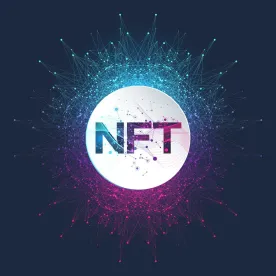In 2020-2021, non-fungible tokens (NFTs) became popular with digital collections such as Bored Ape Yacht Club, NBA Top Shop’s “Moments,” CryptoPunks, Crypto.com’s Loaded Lions, and many more. An NFT is a unique crypto-asset built on the blockchain and may be linked to a piece of art, music, digital collectables like baseball or Pokémon card, stocks, commodities, or skins in a video-game. Like cryptocurrency (e.g., Bitcoin, Ethereum), NFTs use blockchain technology to record ownership and validate authenticity. Unlike cryptocurrency, each token is unique (i.e., non-fungible) and may act similar to a certificate of authenticity. Today, there are many NFTs active on blockchains such as Ethereum, Solana, Crypto.com, and Cardano. Many, NFTs are bought and sold on marketplaces like OpenSea, Rarible, Niftygateway, Crypto.com using cryptocurrency and fiat money (i.e. USD, CAD, EUR, etc.).
NFTs are more like digital property, separate from intellectual property laws like copyrights. Like any other digital asset, it can be bought, sold, delivered, used as collateral, gifted, or mortgaged. When analyzing NFTs, one must be cognizant to distinguish between ownership of:
-
The NFT itself (the Token);
-
The material object which the NFT refers to (the Content or Digital Copy); and
-
The underlying Intellectual Property rights.
In a standard NFT art sale, the seller of the work does not transfer the underlying copyright to the purchaser along with the tokenized digital asset. However, the seller may also grant to the buyer the copyright itself, physical media containing the copyrighted work, or both. “Minters,” the ones who create the NFTs, need to ensure they own all the underlying IP rights prior to “minting” or selling the NFTs.
NFTs have brought upon novel and interesting legal questions involving intellectual property issues with the use of blockchain technology. Enforcement of intellectual property rights and ownership are being tested against an immutable ledger technology. For example, in Miramax, LLC v. Tarantino, 2021 WL 5359414 (C. D. Cal. 2021), Miramax sued director Quentin Tarantino for allegedly auctioning off digital images of Pulp Fiction movie scripts as NFTs. The NFTs were auctioned on the NFT exchange, OpenSea. Miramax argues it owns the entire copyright in Pulp Fiction. In response, Miramax sued Tarantino for breach of contract, copyright infringement, trademark infringement, and unfair competition. Tarantino asserts that he only assigned Miramix the rights to make the motion picture and that he still owns all derivative rights to develop, market, and sell NFTs when he reserved all print publishing rights and “screenplay publication,” including in electronic form. The case is currently pending.
The Digital Millennium Copyright Act (“DMCA”) allows for DMCA Takedown procedures commonly used for protecting copyrights on social media and websites such as YouTube, in which a copyright owner may request an online infringement of its copyright be taken down from the host website. NFTs pose novel enforcement issues and test the practical realities of DMCA Takedown procedures due to the immutability of blockchain technologies. For example, in 2017, Larva Labs created an NFT collection called “CryptoPunks” and sold the 10,000 NFT collection on OpenSea. The original collection was eventually found to contain an error in the smart contract which allowed buyers to withdraw payments while keeping the original digital file. The original license that the V1 collection provided to its buyers was unclear. Larva Labs then minted a second version of the collection (V2), which included identical images as the V1 collection and fixed the bug found in the smart contract. However, some owners of the V1 collection were able to correct the error on their own and began relisting the V1 NFTs they purchased on OpenSea. This prompted Larva Labs in early 2022, to issue a takedown notice to OpenSea requesting removal of the original first version (V1) collection to preserve the value of its V2 collection. OpenSea delisted the V1 collection but the V1 owners filed a DMCA counternotice. Yuga Labs, the creators of the Bored Ape Yacht Club NFT collection, purchased the rights to the V1 collection. Yuga Labs decided not to proceed with any enforcement actions, and instead announced plans to fully transfer IP ownership to the NFTs’ owners. Without Yuga Labs’ actions, the DMCA Takedown procedure would have seen its toughest task in the Digital Millennium.
On February 3, 2022, Nike filed a trademark infringement lawsuit against StockX, a secondary sneaker marketplace. Nike, Inc. v. StockX, 2022 WL 340664 (S.D.N.Y. Feb. 3, 2022). StockX sold NFTs used to authenticate versions of Nike sneakers sold on its website. A buyer of a StockX NFT could also redeem the NFT for a physical version of the Nike shoe. StockX allegedly minted and sold NFTs encompassing the Nike mark, which Nike argues confused consumers and resulted in StockX profiting off Nike's goodwill. StockX claims that the NFTs do not represent physical products or goods but are used as an identifier key for buyers to obtain and identify their physical goods. The case is currently pending discovery.
These cases demonstrate that the IP rights involved in an NFT transaction are generally held in the underlying asset. Companies that sell or make NFTs may need to clear IP rights and obtain licenses in IP in order to mint, promote, or sell NFTs. Thus, it is vital to understand what NFTs cover to determine whether any IP concerns are raised before minting NFTs.



 />i
/>i

